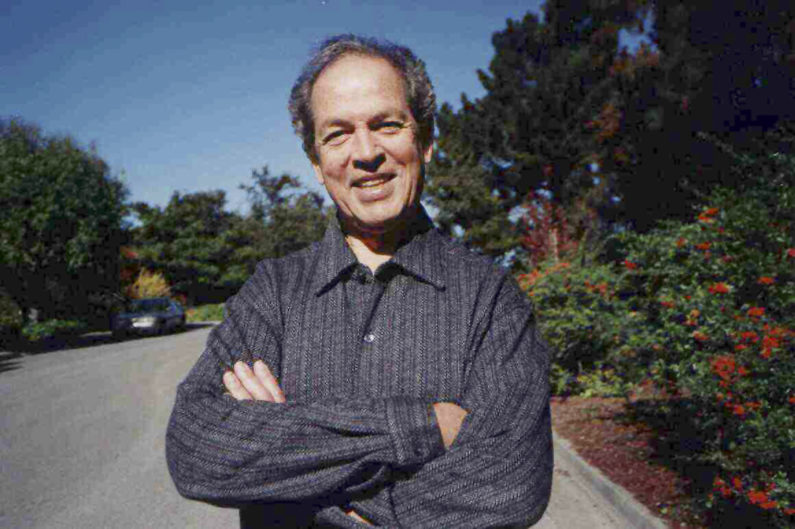Stanford mathematical logician Solomon Feferman dies at 87
A memorial service will be held Oct. 8 for Professor Emeritus Solomon Feferman, one of the leading mathematical logicians of the 20th century. He died July 26 at his Stanford home at the age of 87.
A memorial service will be held Saturday, Oct. 8, at 4 p.m. at the Faculty Club for Solomon Feferman, professor emeritus of mathematics and philosophy and the Patrick Suppes Family Professor in the School of Humanities and Sciences, Emeritus.

Solomon Feferman (1928-2016) was a central figure in the influential logic group at Stanford across a long career in the Philosophy and Mathematics departments. (Image credit: Anita Feferman)
Feferman, widely acknowledged as one of the leading mathematical logicians of the 20th century, died July 26 at his Stanford home after a brief illness following a stroke. He was 87.
The departments of Philosophy and Mathematics are planning a spring symposium event to celebrate Feferman’s work.
In a tribute posted on the Department of Philosophy website, Department Chair R. Lanier Anderson praised Feferman for being “the central figure in the influential logic group at Stanford across a long career in the Philosophy and Mathematics departments.”
Feferman came to Stanford in 1956. He earned his PhD at the University of California, Berkeley, under Alfred Tarski, a mathematician and philosopher known for his work on the concept of truth and the theory of models. Feferman and his wife, Anita, who died in 2015, co-authored a biography of Tarski in 2004. Feferman earned his undergraduate degree in mathematics from Caltech.
Anderson noted that, in addition to teaching at Stanford for 48 years, Feferman served the university as chair of the Department of Mathematics from 1985 to 1992. At various times, he was a visiting fellow or professor at Princeton’s Institute for Advanced Study, MIT and institutions in Paris, Amsterdam, Oxford, Rome and Berkeley. He was the president of the Association for Symbolic Logic from 1980 to 1982 and the 2003 winner of the Rolf Schock Prize in Logic and Philosophy. He was a fellow of the American Academy of Arts and Sciences and editor of Kurt Gödel’s collected works.
Anderson credited Feferman with a “field-shaping” body of work covering what are considered to be the four pillars of mathematical logic: proof theory, set theory, recursion theory and model theory. He had a long-term scholarly interest in exploring the limits of Gödel’s famous incompleteness results and the extent to which they could be overcome.
“Pursuing this general research program led to Feferman’s important work in the 1960s and afterward about transfinite progressions of theories and about predicative analysis – including results which have served as the basis for much subsequent progress in proof theory,” Anderson wrote. Later in his career, Feferman also made major contributions to the technical theory of truth.
Feferman also excelled as a teacher, collaborator and key member of the logic group at Stanford for some 60 years.
“He was the constant presence anchoring an ever-shifting cast of brilliant colleagues in logic, who made Stanford a world-leading center for research in mathematical logic throughout the postwar period,” wrote Anderson. Feferman remained active in the community after becoming emeritus. Anderson wrote that during the last year of his life, Feferman began a new project to extend some of his ideas about model theory into applications in systems biology.
Among Feferman’s students was Provost John Etchemendy, who will speak at the memorial service. Etchemendy remembers the “precise proofs he would meticulously outline on the blackboards. Then he would go back, erase one and put up another equally incredible one – and this might continue three or four times in a class period. He was renowned for this.”
Etchemendy said he and other students were awed by Feferman’s intellect, but their intimidation was mitigated by his generosity and kindness.
“Sol was probably the sweetest man in the world,” Etchemendy said. “He had a heart of gold. He and Anita made Stanford and the Philosophy Department a welcoming place for a hopelessly insecure graduate student and his wife. Their warmth, kindness and generosity meant everything to Nancy and me – and no doubt to the other graduate students under their careful watch.”
Feferman was preceded in death by his wife, Anita, and by his older daughter, Rachel. He is survived by his younger daughter, Julie, and two granddaughters, Isabel and Gracie.
